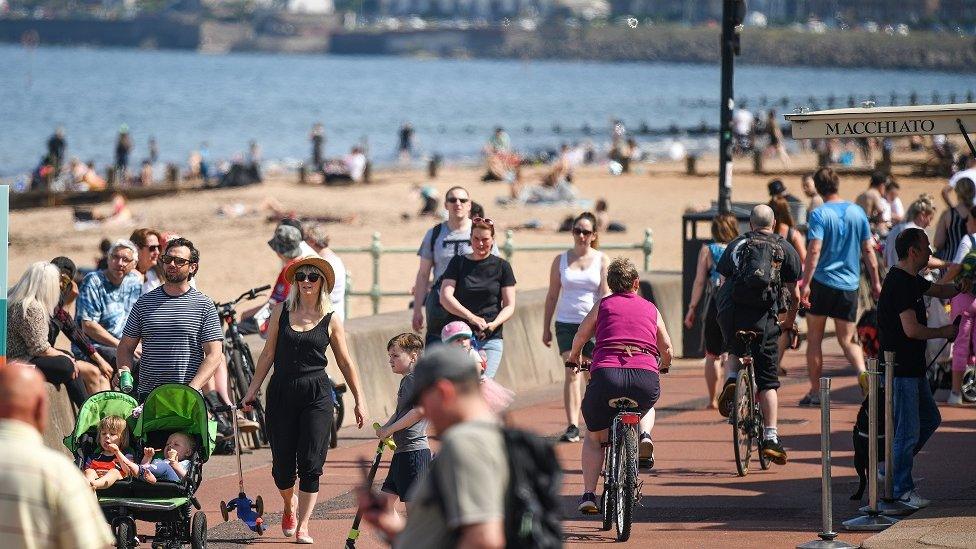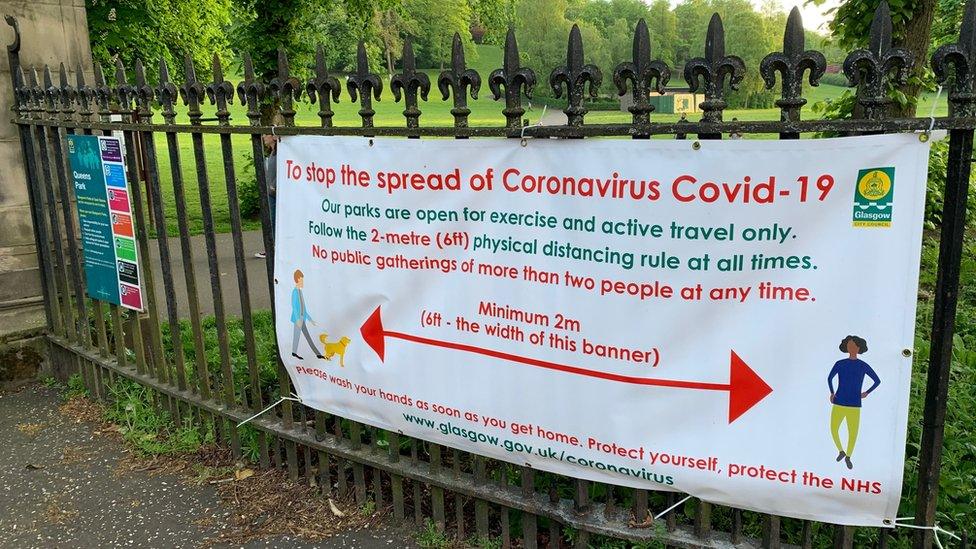Coronavirus: Scottish lockdown easing to begin next week
- Published
- comments
Ms Sturgeon confirmed that schools will not open to pupils until August
Lockdown restrictions in Scotland are likely to be relaxed slightly from 28 May, Nicola Sturgeon has confirmed.
The first minister made the announcement as she unveiled a four-phase "route map" aimed at restarting society while suppressing the virus.
The first phase will include allowing people to meet outside with people from one other household.
Schools will reopen on 11 August - meaning many will return a week earlier than planned after the summer holiday.
But the first minister said children will return to a "blended model" where they will do a mix of school and home learning.
Teachers will return to schools in June, with transition support being given, where possible, to children going into Primary 1 or moving from primary to secondary schools.
And an increased number of children will have access to critical childcare - which has been provided for the children of key workers during lockdown.
Ms Sturgeon said the first phase of easing will see garden centres and recycling facilities reopen, while some outdoor activities such as golf, fishing, tennis and bowls will be allowed again, as will outdoor work such as agriculture and forestry.
People will also be able to sit or sunbathe in parks and open areas, and will be able to meet people from one other household - although only initially in small numbers and while they are outside.
Different households should remain two metres apart from each other, and visiting inside other people's houses will not be permitted in the first phase.

Hundreds of people flocked to the beach in Edinburgh on Wednesday on what was the hottest day of the year in Scotland so far
In addition, people will be able to travel - preferably by walking or cycling - for recreation, although they will be asked to remain "where possible" within or close to their own local area.
Take-away and drive-through food outlets will no longer be discouraged from re-opening, so long as they apply safe physical distancing, but "non-essential" indoor shops, cafes, restaurants and pubs must remain closed during the first phase.
There will also be a phased resumption of some aspects of the criminal justice system, as well as face-to-face Children's Hearings, and people at risk will have more contact with social work and other support services.
And NHS services which were cancelled because of the coronavirus crisis will "carefully and gradually" resume.

The route map for easing lockdown

The Scottish government has identified four phases for easing the restrictions, external:
Phase 1: Virus not yet contained but cases are falling. From 28 May you should be able to meet another household outside in small numbers. Sunbathing is allowed, along with some outdoor activities like golf and fishing. Garden centres and drive-through takeaways can reopen, some outdoor work can resume, and childminding services can begin.
Phase 2: Virus controlled. You can meet larger groups outdoors, and meet another household indoors. Construction, factories, warehouses, laboratories and small shops can resume work. Playgrounds and sports courts can reopen, and professional sport can begin again.
Phase 3: Virus suppressed. You can meet people from more than one household indoors. Non-essential offices would reopen, along with gyms, museums, libraries, cinemas, larger shops, pubs, restaurants, hairdressers and dentists. Live events could take place with restricted numbers and physical distancing restrictions. Schools should reopen from 11 August.
Phase 4: Virus no longer a significant threat. University and college campuses can reopen in full, mass gatherings are allowed. All workplaces open and public transport is back at full capacity.

The situation will be reviewed every three weeks, with further phases of easing being introduced if enough progress is being made on keeping the virus under control.
However, Ms Sturgeon said she hoped to be able to move more quickly than that if the evidence allows.
She described the first steps as "proportionate and suitably cautious", and said they were intended to "bring some improvement to people's wellbeing and quality of life, start to get our economy moving again, and start to steer us safely towards a new normality".
The first minister added: "It's important to stress, though, that while the permitted reasons to be out of your house will increase, the default message during phase one will remain stay at home as much as possible."

Ms Sturgeon said her route map did not yet set definite dates for when future phases will be introduced, because the virus is unpredictable.
She said: "Our emergence from lockdown will be faster or slower, depending on the continued success that we have in suppressing the virus.
"In the weeks ahead our messages will become more nuanced and complex as we strike a difficult balance protecting public health and allowing personal choice.
"Straightforward, strict rules will gradually be replaced by the need for all of us to exercise judgment and responsibility."
However, Ms Sturgeon said key advice such as isolating if you have symptoms of Covid, strict physical distancing, washing your hands and face coverings will remain the same.
The Scottish Conservatives said the route out of lockdown would only succeed if the Scottish government "sorts out problems with testing".
The party's leader, Jackson Carlaw, said: "Unfortunately, failings on testing so far have been the weakest aspect of this SNP government response to the coronavirus crisis.
"Tens of thousands of tests have gone unused and there have been major problems in getting tests to the vulnerable people who need them most, and those who work with them.
"And now we learn that the health secretary badly misled the public, external on the issue of elderly people being discharged from hospital to care homes without being tested for Covid-19."

A SIMPLE GUIDE: How do I protect myself?
LOOK-UP TOOL: Check cases in your area
MAPS AND CHARTS: Visual guide to the outbreak

Some of the easing measures announced by Ms Sturgeon were introduced in England last week, but the first minister said at the time it would not be safe for Scotland to follow the same timetable.
This was largely because the so-called R number - essentially the rate at which the virus is spreading - has been higher in Scotland than in some other parts of the UK.
However the number of people who are dying with coronavirus in Scotland has been falling in recent weeks, as has the number of patients needing hospital treatment and intensive care.
This has given the first minister and her advisers more confidence that any relaxation of the lockdown - which was introduced across the UK on 23 March - will not lead to a resurgence in the virus.
Dr Poppy Lamberton, an epidemiologist at Glasgow University, said the "lag" between Scotland and England would help the Scottish government to judge the potential impact of easing the lockdown, and whether it will lead to an increase in the infection rate.


Use the form below to send us your questions and we could be in touch.
In some cases your question will be published, displaying your name, age and location as you provide it, unless you state otherwise. Your contact details will never be published. Please ensure you have read the terms and conditions.
If you are reading this page on the BBC News app, you will need to visit the mobile version of the BBC website to submit your question on this topic.